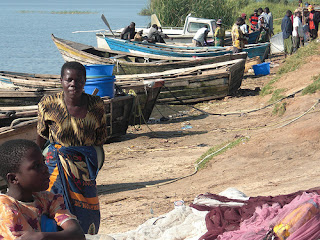UN Day: Stories of Climate Change and Courage
Happy UN Day!
I had the great fortune of attending my first UN Townhall meeting which was to commemorate UN Day on the 24th of October. The first thing I learnt about Townhall is that it doesn't take place in a town hall. After some speculation I came to the conclusion that Townhall was not a description of the physical structure, but rather a meeting of the minds of staff from all UN derivative groups such as UNICEF, UNDP, UNESCO, etc, to discuss current agendas. This year, the main agenda was (suitably) climate change. Speaking on the issue was Professor S. Chiota, who teaches at Chancellor College (Chanco), and is the regional programme director of the Leadership for Environment and Development Southern and Eastern Africa - LEAD SEA (http://www.leadsea.mw/ ) .
What I had expected was a presentation of the facts and figures of the effects of climate change in Malawi, with graphs and pie charts showing how things have been getting progressively worse over the years.
What he did instead made me sit up and listen...
From Lake to Puddle
He told us about the research he had been conducting on Lake Chilwa, one of the less famous lakes, south of Lake Malawi. At only 5metres at its maximum depth, it is highly prone to drought - at the worst times you can walk across the bottom without getting your feet wet.
 |
| (Flickr.com) |
 |
| (Panoramio.com) |
One such story stayed in my mind long after the meeting was over, and so has found its way to my blog.
True Story
It was the story of a village that had settled in the area where floods had begun to invade, when previously they had been on safe ground. Things had changed. The water flowed faster than it had in previous years across the land, carrying precious soil away with it... and destructive power. There were no longer any trees to slow the flow and hold the soil in place. The village chief decided that everyone would have to evacuate before the floods came. As the water rose, the chief went from home to home to make sure that each and every villager had fled to higher ground. He reached the last home and was satisfied that everyone had safely escaped... except the chief himself. By this time, the water was too high for him to escape. Struggling against the currents, he caught onto a tree, and climbed up to safety. The floods kept rising, but did not reach him. For three days the floods didn’t subside...
When the waters went down, the villagers returned distraught about their leader who had taken 'service before self' to a new level. Fortunately for this story, the starving chief turned up just as they gathered to mourn for his loss!
What's Next?
Climate change has far reaching effects. No one can tell these villagers that nothing has changed. The factors that many are not aware of are the far-reaching social effects, such as the cultural belief that individuals with special powers are responsible for unwanted weather, and should be suitably punished. The conflict caused by the migration of 7500 fishermen to Lake Malawi, which the fishermen there feel is their territory.
It is the tragedy of our time that climate change has the greatest effect on the regions that have the lowest contribution. But that does not absolve us of responsibility. Flash flooding and soil erosion are caused by weather change, AND deforestation – the latter is something which we can take control of with reforestation and determined stewardship of our resources. Read about some methods of adaptation to floods and droughts that have been innovated in Malawi: Africa Most Vulnerable to Climate Change
Malawi's Bioscientist Tips on Utilising Floods
7 Billion Strong
To wrap up Townhall, the Secretary-General Ban Ki-moon's UN Day speech was read out. In the speech, he addressed the reality that the human population is approaching seven billion people on the 31st of October. While there are many challenges, SG Ki-moon spoke in the name of unity – imagine that many of us united towards a better world! We would be the most awesome planet ever!
You can find the speech here: SG Message, as well as a real time world population counter here: 7 Billion Strong
--------------------
Are you a girl? Know a girl? Seen a girl today? Read about the far reaching impact of The Girl Effect in my previous post!




Comments
Post a Comment